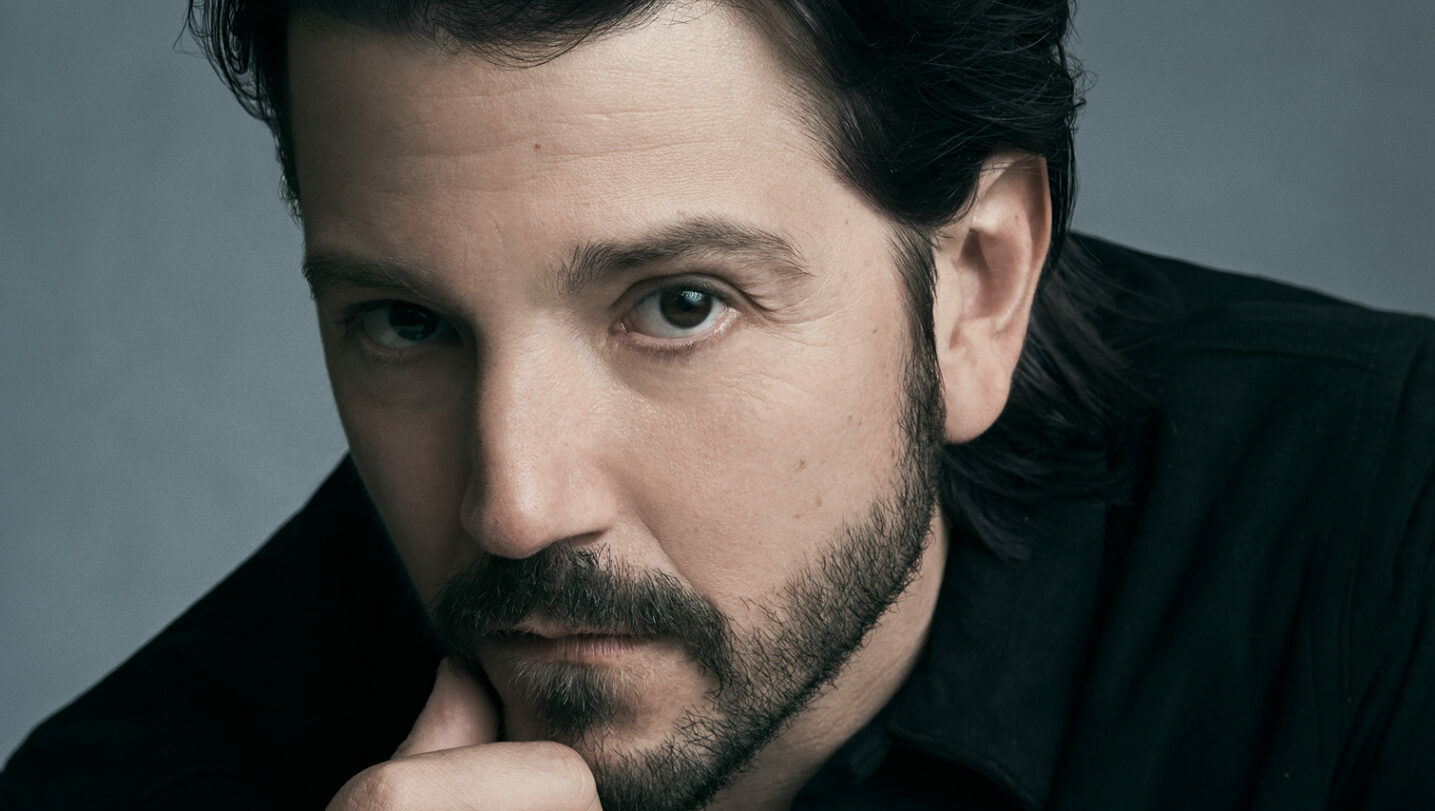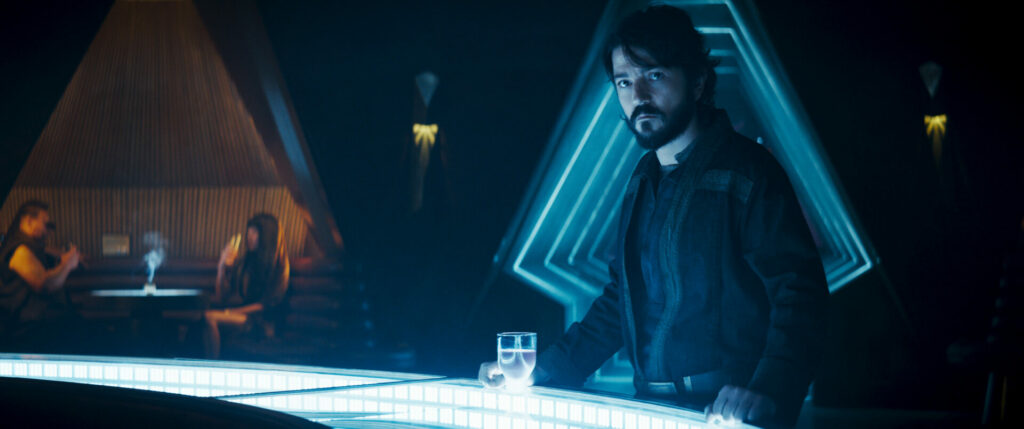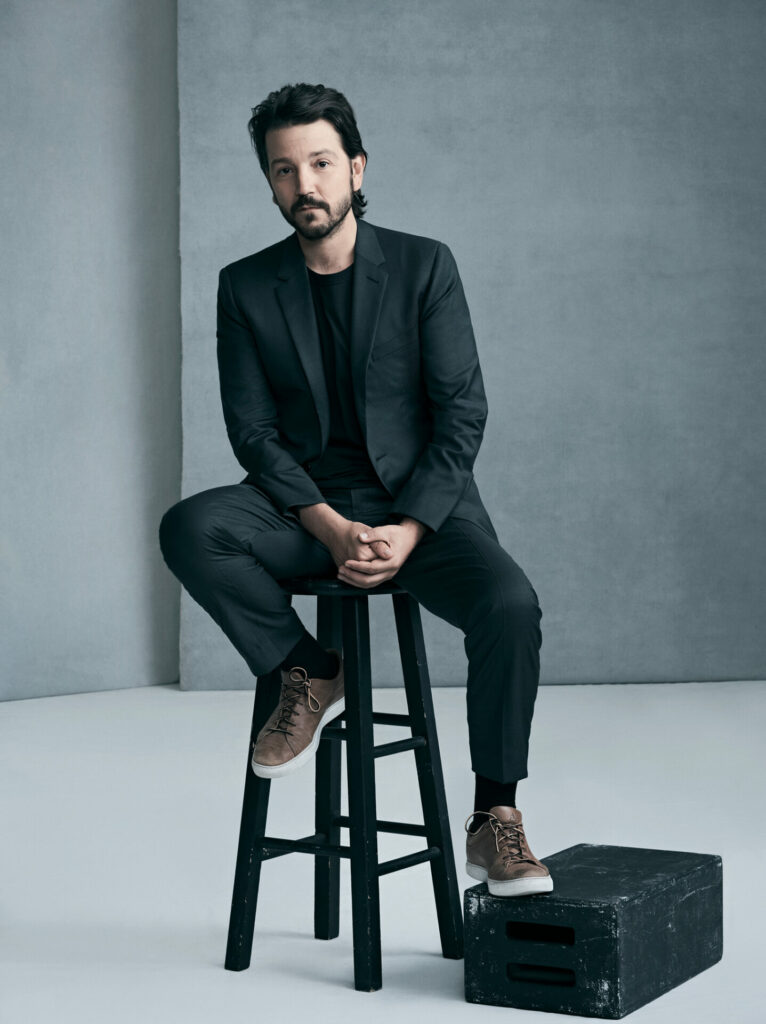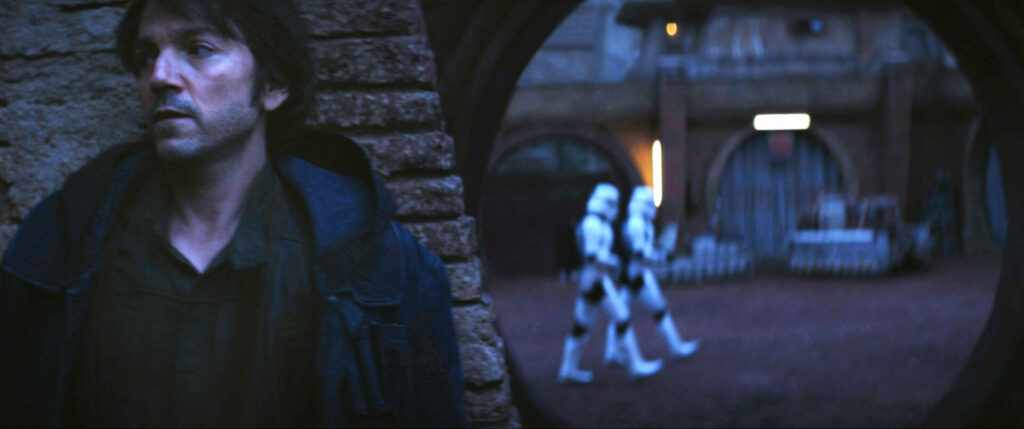Diego Luna: parallel lives
Diego Luna found his inspiration close to home when it came to filming ‘Andor’, the prequel series to ‘Star Wars: Rogue One’, one of the most celebrated films of the beloved sci-fi franchise
By Al Horner

Diego Luna adores Star Wars, but is open to the possibility that, for almost 40 years, the sci-fi saga sold a lie.
Its theory went that change is only possible when a magical hero enacts it for us; that revolution requires a Skywalker-style “chosen one”, who’ll swashbuckle their way through a Death Star on behalf of the rest of the galaxy.
It’s a story template that’s existed for centuries in literature and more recently in film, but the actor doubts that the real world works in the same manner. “You either get involved or you grow indifferent,” Luna tells Rolling Stone UK, describing his belief that it’s up to ordinary people to rise up and take a stand. “Climate change is the biggest example,” he stresses, pointing to how there’s no Jedi warrior-like individual waiting in the wings to save us from that existential threat. “It requires working together. We’re all going to have to deal with the impact of our existence on this planet sooner or later. Wherever and whoever you are in the world, your actions matter as much as anyone else’s. That realisation demands [that each of us] take responsibility and articulate action… which is exactly what Rogue One was all about.”
Ah, yes, Rogue One — the Star Wars movie that dared to send a different message from the films in the franchise that preceded it. In the 2016 prequel to 1977’s A New Hope, Luna starred as Cassian Andor — a ruthless, charismatic freedom fighter willing to lay down his life to help bring an end to the Empire. Cassian, like the rest of the rebels he partners with, had no connection to the Force. He couldn’t wield a lightsaber or move objects with his mind. Instead, it was a film that, after 39 years of Star Wars stories centring on the Skywalker family, brought to the forefront everyday, non-superpowered people banding together to oppose injustice. “That beautiful idea of regular citizens doing extraordinary things, becoming more powerful when we join together,” Luna says, “was and still is very important.”
“I’ve never worked on a project so intense. You know what’s going to happen but you don’t know how”
— Diego Luna
Which is perhaps why on 21 September, Cassian is making a comeback in one of 2022’s most eagerly awaited TV series. Andor will see Luna return to play the rebel spy across 12 episodes that explore the character’s life before the events of Rogue One. “It’s a series that has the feel and gigantic scope of a Star Wars story, but also intimate character moments, in which you’re meeting someone that feels like they really exist,” the 42-year-old explains, promising a show that carries on the departure in tone offered in the gritty Rogue One — a movie which announced its edgier intentions by having Cassian kill an informant in cold blood in its opening 10 minutes.
There’s a list as long as Jabba’s tail of things Luna cannot tell me about Andor: for example, whether or not, like recent Star Wars TV hits The Mandalorian and The Book of Boba Fett, it features cameos from familiar characters like Ewan McGregor’s Obi-Wan Kenobi or Hayden Christensen’s Darth Vader. “Come on, man! I can feel someone watching me through the window, waiting for me to slip up,” he laughs, suspecting Disney may have positioned a Sith assassin somewhere in the shadows outside his holiday home. (It’s mid-July and Luna is supposed to be on vacation. Instead, he’s cheerily fielding calls and meetings all day; being one of the most in-demand actors this side of Dagobah has its drawbacks.)
What Luna can share is that the series is a vital and daring new chapter in the sci-fi saga that, like Rogue One before it, pushes the boundaries of what a Star Wars story can be. “I’ve never worked on a project so intense,” he reveals. “You know what’s going to happen but you don’t know how. The storytelling is psychologically driven — it’s about the complexity of characters, not necessarily the result of an event.” Its title, Andor, “in a way misleads you”, he says. “It’s not just about him. It’s about the beginning of a revolution, and the many characters it takes to spark that kind of change.” Getting to this moment, however, saw the actor facing down challenges of his own.

Luna has never stormed a military base in outer space, nor skulked around an alien world, blaster cocked, ready to take down a swarm of stormtroopers. That’s not to say there aren’t other ways, however, in which his and Cassian’s lives have overlapped. In common with the rebel spy — and many other characters who frequent the Star Wars universe, a place where characters are frequently driven by parental absence or loss — Luna suffered the death of a parent at an early age. His mother, British costume designer Fiona Alexander, died in a car crash when Luna was just two years old. Like Cassian, Luna attempted to fill the void left in her wake by throwing himself into a cause. Cassian’s was guerrilla warfare; Luna’s, meanwhile, was acting.
Years on stage in Mexico City (encouraged by his father Alejandro, a set designer) led to appearances in Latin American TV shows. Acting helped him feel closer to his late mother: “I felt her warmth around me,” he told C Magazine in 2019 about his early work on stage and screen. It helped him get a handle on intermittent episodes in which his father would find him sleepwalking in the middle of the night, venturing out onto his patio, sharing imaginary conversations with his mother. These episodes soon subsided, as Luna discovered a confidence and catharsis in performing that would eventually lead him to his breakout role. Y Tu Mamá También — Alfonso Cuarón’s acclaimed 2001 coming-of-age road-trip drama — saw Luna play an upper-class dreamer named Tenoch Iturbide opposite his childhood friend Gael García Bernal. It was an instant Spanish-language cinematic classic, announcing the actor as a sensitive, sparkly-eyed screen presence it was impossible to drag your eyes away from. Every frame he appeared in, critics noted, seemed to crackle with electricity and longing.
The actor quickly built on this reputation with appearances in films like 2002’s Kahlo biopic Frida and, the following year, gangster drama Nicotina, causing Hollywood to sit up and take notice. Steven Spielberg cast him in The Terminal (2004). Gus Van Sant also came calling. Even Katy Perry couldn’t resist his magnetic allure, casting him as a love interest in a 2010 music video that currently sits at 924 million YouTube views and counting (‘The One That Got Away’). During these years, it was clear he was making progress climbing a certain ladder in American film, but Luna never allowed himself to truly believe that he could reach its highest rungs. Hispanic men, after all, were historically boxed out of meaty parts in Hollywood blockbusters. Drug runners and restaurant waiters? Those parts were available in abundance for Mexican actors like Luna. Heroic leads? Not so much.

“I thought I belonged very much in independent cinema. That was my home. Theatre was my home,” Luna recalls. “A Star Wars movie [on the other hand] was what I went to see at the weekend with a box of popcorn in the cinema. It was far, far away from what I thought I was capable of.” As a result, when the offer to play Cassian in Rogue One came in, it sent a shockwave through him only a couple of notches below that of a planet-ending Death Star laser blast.
The film would become a smash hit, generating over $1bn at the box office and earning rave reviews for its bold conclusion, in which — spoiler alert — Cassian and co sacrifice themselves to achieve their mission. “I remember watching it with my daughter. Towards the end, she was yelling: ‘What’s happening? What sort of film is this?’ She was horrified,” laughs Luna. “Then later we began chatting and she realised that it’s beautiful to serve something bigger than us.”
This, incidentally, is a subject that Luna found himself contemplating at length in the period around Rogue One’s release. As the film debuted in cinemas, Luna was anointed a sought-after Hollywood leading man at long last. How did he respond to his new status? “I left,” Luna grins.

In 2017, the star made the decision to move his family back to his native Mexico. He’d been living in a house with a beach view in Los Angeles but felt an urgent need to try to use his position to better the community where he grew up. “I don’t want my kids to see me looking at the news from my living room in LA, complaining about what’s happening… I want them to see me here, fighting for something I love,” he told the LA Times in 2018. Reflecting on the decision today, he appears bashful at Rolling Stone UK’s suggestion that there are echoes of Cassian in his determination to defend the place he calls home. “Mexico is a country where you’re really exposed to contrast,” he explains. “It’s very rich culturally, but at the same time it’s a very unfair place. I belong to Mexico — but in order to belong you have to activate. You have to get involved.”
Luna’s interpretation of “getting involved” is as intense as his Star Wars character’s trademark glare. First he starred in Privacidad, a play about the Mexican government’s surveillance of human rights defenders. He then became a vocal opponent to then-president Enrique Peña Nieto’s plans to expand Mexico’s vicious “war on drugs”, which had resulted in more than 230,000 deaths. He also got to work establishing a non-profit organisation with García Bernal that raised $1.5m in relief funds following the 2017 Mexico City earthquake.
Cassian’s activism might be more explosive, but Luna’s is no less effective. “I think that what we do has a great potential to bring reflection on and attention to what matters. It’s through films that I became aware of many things that matter to me today. So as filmmakers we have that opportunity,” he says. “If I can use my profile to shift attention onto the people and things that I believe are worthy of attention, then I like to do that.”
“If I can use my profile to shift attention onto the people and things I believe are worthy of attention, then I like to do that”
— Diego Luna
With the release of Andor, Luna’s profile may be about to hit even greater heights. The series, created by Bourne Identity and Michael Clayton screenwriter Tony Gilroy, is primarily set five years before that mission in Rogue One, although there’s plenty of flashbacks too, filling in the blanks in Cassian’s journey following the less-is-more approach to his backstory in Rogue One. “If you analyse that film, there’s very little information. We know very little about him. So we have a lot of room to play in,” teases Luna. With its elongated runtime, compared to the compact two-hour space afforded to Rogue One, it’s said to show more methodically all the ways that oppressive forces can radicalise, colonise and brutalise those in their way. And as for Cassian, well, by the end of Rogue One, his friendship with Jyn Erso (Felicity Jones) has softened some of his harder edges. This version of Cassian is not yet that man. Instead, it’s the freedom fighter at his most morally complex, say sources close to the series.
Luna is about to begin shooting the show’s second season, which he says will intensify the timely questions and themes of the initial 12 episodes about to land on screens. “It’s quite interesting to tell a story about heroic actions that transcends the moment where the hero gets the medal and walks off into the sunset saying: ‘We made it!’ In Rogue One, they didn’t make it. But it was still worth it, you know? It’s an interesting moment right now to be sending that message,” he comments. When the idea for Andor came around, Luna had thought his time portraying the character had come to an end, that his days dispatching stormtroopers and sneaking around Empire bases was over. Now he’s back, he’s not taking the experience for granted. “I feel lucky. Very lucky,” he beams. “Rogue One was always something very special in my life. Now I feel even more at home in that galaxy far, far away.”
Andor premieres on Disney+ on 21 September.
Taken from the October/November 2022 issue of Rolling Stone UK. Buy it online now.
